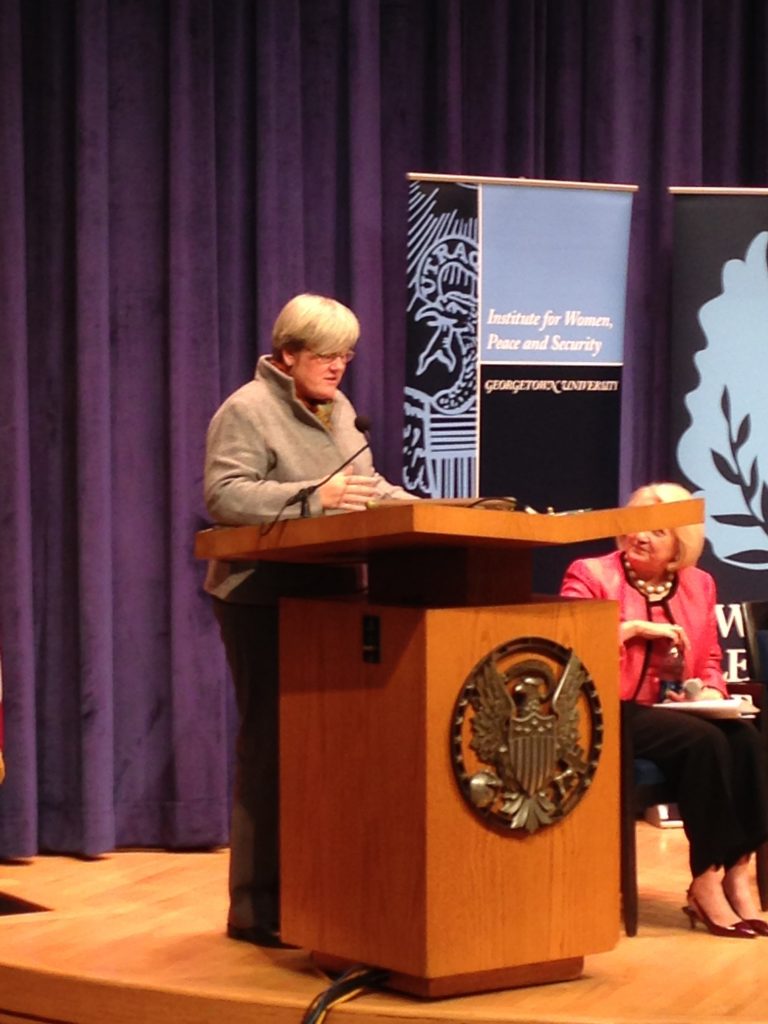Georgetown Institute for Women, Peace, and Security (GIWPS) hosted a panel Oct. 16 that discussed the role women play in combating climate change and the importance of women’s agency in reaching international agreements on climate. The Friday panel, moderated by GIWPS Executive Director Melanne Verveer, featured U.N. Special Envoy for Climate Change Mary Robinson, former President of Finland Tarja Halonen, and CEO of the Global Alliance for Clean Cookstoves Radha Muthiah.
The panel coincided with the release of a report from GIWPS titled “Women and Climate Change: Impact and Agency in Human Rights, Security, and Economic Development.” Rachel Kyte, World Bank special envoy for climate change, gave closing remarks.
Robinson, who gave the keynote address before the panel discussion, emphasized that while many are aware that climate disproportionately affects poor women and children, women’s involvement in fighting the harms of climate change is crucial.
“Women across all sectors of society are already leading the way in efforts to build resilience and adapt to the impacts of climate change,” Robinson said. “They’re demonstrating their unity, collective ambition, and their willingness to act with urgency, regardless of their societal or political position. At the local and community level, women are driving innovative climate action, and their participation in the ongoing climate debate will be critical.”

Ryan Miller
Robinson also stressed the importance of changing the current language in the draft proposals of the 2015 U.N. Climate Change Conference, or the 21st Conference of Parties (COP21), to highlight gender equality and human rights. COP21 will meet in Paris in November and December, and the parties hope to reach a legally binding agreement to reduce the impacts of climate change.
Halonen echoed Robinson’s sentiment for the need to include gender in the COP21 agreement, but noted that it may take a miracle, referencing the Doha Miracle that greatly expanded the role of women in the COP18 agreement formed in Doha in 2012.
In her closing remarks, Kyte cited the need for women’s involvement in all future climate talks to ensure a diversity of opinions be heard for such a big risk.
“We know from studies upon studies upon studies upon studies from neuroscience, from biology, from social studies, that if we are going to have true risk management, we need diverse opinions in the room,” Kyte said. “So if [climate change] is the biggest risk issue we face, then we [women] have to be in the room.”
For Muthiah, women play an important role in these discussions due to their ability to view problems holistically. Her foundation works to empower women through the use of sustainably designed cookstoves that women can employ for multiple purposes.
“Women are the ones who are looking holistically at the needs of their family and their communities. So when women are confronted with this issue of challenges in cooking, they said, ‘Well it doesn’t stop with cooking. We’ve got challenges for lighting, for our children to do homework at night. We’ve got challenges for ensuring charging of cellphones” Muthiah said. “So they’re the ones who start to innovate and provide feedback to say, ‘a cookstove shouldn’t just be for cooking. How about the cookstove provide light within the household, provide cell phone charging devices?’”
All the panel participants have high hopes for the COP21 conference as it relates to women’s role. As Kyte noted, strong input from women at the conference will necessary to ensure strong action.
“We cannot afford to not act now because the price of inaction is so much higher than the price of action. So however difficult a decision to do one thing rather than another is… it is nowhere near as difficult as having to completely rebuild [a set of values].” Kyte said. “And that’s why you [women] need to be in the room.”






